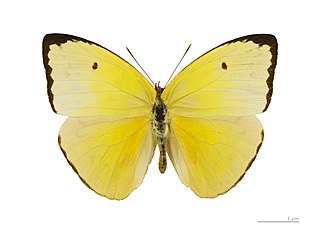 W
WAphrissa statira, the statira sulphur, is a species of Lepidoptera in the family Pieridae. The species is a medium-sized yellow butterfly, with females more pale than males. They are found from southern regions of Florida and Texas through southern Brazil and northern Argentina. The caterpillars feed on the leaves of several local host plants, while adults prefer to feed on the nectar of red or orange colored flowers. The species is most noted for their dramatic migrations in the tropical areas of the Americas. They have been the subject of many studies about how butterflies navigate and orient during migration.
 W
WBattus belus, the Belus swallowtail is a species of butterfly from the family Papilionidae that is found in Brazil, Colombia, Guatemala, Peru and Venezuela.
 W
WBattus ingenuus, the Dyar's swallowtail or confused swallowtail, is a species of butterfly in the family Papilionidae.
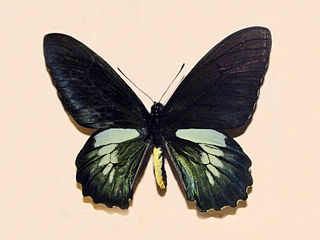 W
WBattus laodamas, the green-patch swallowtail or yellow-spotted swallowtail, is a species of butterfly in the family Papilionidae.
 W
WBattus polydamas, also known as the gold rim swallowtail, the Polydamas swallowtail or the tailless swallowtail, is a species of butterfly in the family Papilionidae. The species was first described by Carl Linnaeus in his 10th edition of Systema Naturae, published in 1758.
 W
WColobura dirce, the Dirce beauty, mosaic or zebra mosaic, is a butterfly of the family Nymphalidae. It is found in Central America. the Caribbean, and northern South America.
 W
WDoxocopa laure, the silver emperor, is a species of butterfly of the family Nymphalidae.
 W
WDynamine postverta, the Mylitta greenwing or four-spot sailor, is a butterfly in the family Nymphalidae. It is found throughout most tropical and subtropical areas of Central and South America, from Mexico south to Argentina and Paraguay. The habitat includes primary rainforests, humid deciduous woodlands, scrubby grassland and farmland at altitudes up to about 900 metres.
 W
WEueides isabella, the Isabella's longwing or Isabella's heliconian, is a species of nymphalid butterfly, belonging to the Heliconiinae subfamily.
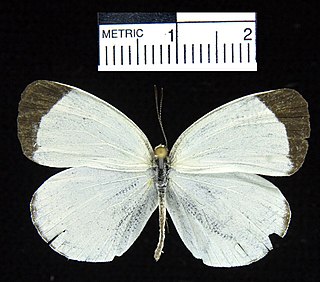 W
WEurema albula, the ghost yellow, is a butterfly in the family Pieridae. It is found from southern Texas south through the West Indies and mainland tropical Central and South America to Brazil. The habitat consists of tropical forests and second growth.
 W
WEurema leuce, the Hall's sulphur, is a butterfly in the family Pieridae. It is found on the West Indies and in Brazil, Uruguay, Colombia, and Venezuela.
 W
WEurema mexicana, the Mexican yellow, sometimes called the wolf-face sulphur, is a North and South American butterfly in the family Pieridae. It occurs mainly in Mexico but occasionally is found in central and southwestern United States and rarely in Canada.
 W
WEurema proterpia, the tailed orange, is a North and South American butterfly in the family Pieridae.
 W
WGreta andromica, the Andromica clearwing, is an ithomiine butterfly from the subfamily Ithomiinae. It was described by William Chapman Hewitson in 1854.
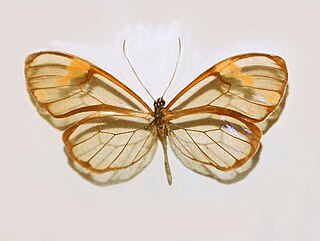 W
WGreta libethris, the Libethris clearwing, is a day active ithomiine butterfly from the subfamily Ithomiinae.
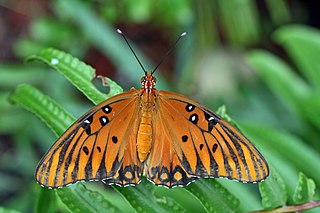 W
WThe Gulf fritillary or passion butterfly is a bright orange butterfly in the subfamily Heliconiinae of the family Nymphalidae. That subfamily was formerly set apart as a separate family, the Heliconiidae. The Heliconiinae are "longwing butterflies", which have long, narrow wings compared to other butterflies. Gulf fritillary is the only member of genus Agraulis.
 W
WHamadryas amphinome, the red cracker, is a species of cracker butterfly in the family Nymphalidae, native to regions of North and South America.
 W
WHamadryas feronia, the blue cracker or variable cracker, is a species of cracker butterfly in the family Nymphalidae. It is found in the southern parts of North America and southwards to Brazil.
 W
WHeliconius antiochus, the Antiochus longwing, is a butterfly of the family Nymphalidae. It was described by Carl Linnaeus in 1767. It is found from Panama to the Amazon region. The habitat consists of riparian forests.
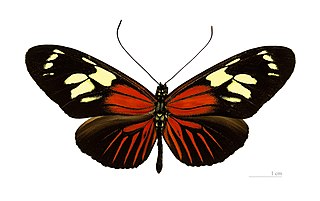 W
WHeliconius burneyi, the Burney's longwing, is a butterfly of the family Nymphalidae. It was described by Jacob Hübner in 1831. It is found in the Amazon basin. The habitat consists of tall forests.
 W
WHeliconius charithonia, the zebra longwing or zebra heliconian, is a species of butterfly belonging to the subfamily Heliconiinae of the family Nymphalidae. It was first described by Carl Linnaeus in his 1767 12th edition of Systema Naturae. The boldly striped black and white wing pattern is aposematic, warning off predators.
 W
WHeliconius elevatus is a butterfly of the family Nymphalidae. It was described by Nöldner in 1901. It is found in the Amazon Basin. The habitat consists of riparian forests.
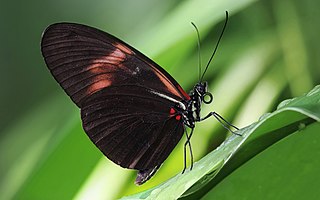 W
WHeliconius melpomene, the postman butterfly, common postman or simply postman, is a brightly colored butterfly found throughout Mexico and Central America. It was first described by Carl Linnaeus in his 1758 10th edition of Systema Naturae. Its coloration coevolved with a sister species H. erato as a warning to predators of its inedibility; this is an example of Müllerian mimicry. H. melpomene was one of the first butterfly species observed to forage for pollen, a behavior that is common in other groups but rare in butterflies. Because of the recent rapid evolutionary radiation of the genus Heliconius and overlapping of its habitat with other related species, H. melpomene has been the subject of extensive study on speciation and hybridization. These hybrids tend to have low fitness as they look different from the original species and no longer exhibit Müllerian mimicry.
 W
WHeliconius ricini, the ricini longwing, is a butterfly of the family Nymphalidae. It was described by Carl Linnaeus in 1758. It is found from Venezuela and Trinidad to the Guianas and northern Brazil. The habitat consists of savanna-type areas.
 W
WHeliconius wallacei, the Wallace's longwing, is a butterfly of the family Nymphalidae. It was described by Tryon Reakirt in 1866. It is found from Venezuela and Trinidad to southern Brazil and Peru. The habitat consists of lowland rainforests.
 W
WHistoris acheronta, the tailed cecropian, is a species of crescents, checkerspots, anglewings, etc. in the butterfly family Nymphalidae.
 W
WHistoris odius, the orion cecropian, is a species of crescents, checkerspots, anglewings, etc. in the butterfly family Nymphalidae.
 W
WThis is a list of butterflies of the Amazon River basin and the Andes.
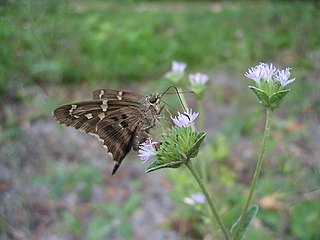 W
WThe long-tailed skipper is a spread-winged skipper butterfly found throughout tropical and subtropical South America, south to Argentina and north into the southern part of the United States of America. It cannot live in areas with prolonged frost. It is a showy butterfly, with wings of light brown tinted with iridescent blue, and two long tails extending from the hindwings. The robust body is light blue dorsally. It has a large head, prominent eyes, and a wingspan between 4.5 and 6 centimeters.
 W
WMorpho rhetenor, the Rhetenor blue morpho, is a Neotropical butterfly of the family Nymphalidae. It is found in Suriname, French Guiana, Brazil, Peru, Ecuador, Colombia, and Venezuela.
 W
WPyrrhopyge is a Neotropical genus of firetips in the family Hesperiidae.
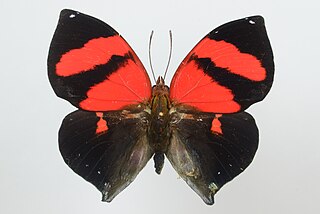 W
WSiderone galanthis, the scarlet leafwing or red-striped leafwing, is a species of butterfly of the family Nymphalidae. It is found from Mexico to southern Brazil. The habitat consists deciduous and evergreen forests at altitudes up to 900 meters.
 W
WStrymon bazochii, the lantana scrub-hairstreak or smaller lantana butterfly, is a butterfly in the family Lycaenidae. It is found from Paraguay north through Central America, the West Indies and Mexico to southern Texas. It was introduced to Hawaii in 1902 to control Lantana species, in which it has proven unsuccessful.
 W
WTelemiades is a Neotropical butterfly genus in the family Hesperiidae.
 W
WThessia is a genus in the family Hesperiidae (Eudaminae).
 W
WTyphedanus is a Neotropical butterfly genus in the family Hesperiidae (Eudaminae).
 W
WUdranomia is a Neotropical butterfly genus in the family Hesperiidae (Eudaminae).
 W
WUrbanus dorantes, the lilac-banded longtail or Dorantes longtail, is a butterfly of the family Hesperiidae. It is found from Argentina, north through Central America, Mexico, and the West Indies to southern Texas and peninsular Florida. Strays can be found as far north as northern California, southern Arizona, southern Missouri and North Carolina.
 W
WUrbanus procne, the brown longtail, is a butterfly of the family Hesperiidae. It is found from Argentina, north through Central America and Mexico to southern Texas. Rare strays can be found up to southern New Mexico, southern Arizona and southern California.
 W
WUrbanus simplicius, the plain longtail, is a butterfly of the family Hesperiidae. It is found from Argentina, north through Central America, Mexico, and the West Indies to southern Texas and peninsular Florida.
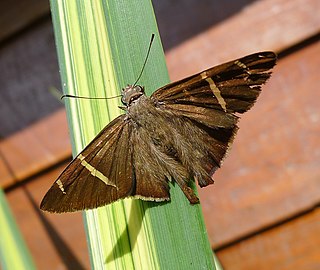 W
WUrbanus tanna, the Tanna longtail, is a butterfly of the family Hesperiidae. It is found from Ecuador and French Guiana, north through Central America to Mexico. Rare strays can be found up to the lower Rio Grande Valley in Texas.
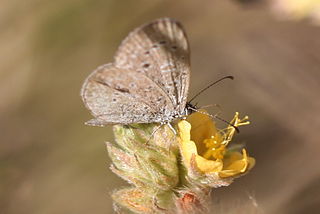 W
WZizula cyna, the cyna blue, is a butterfly species in the family Lycaenidae.